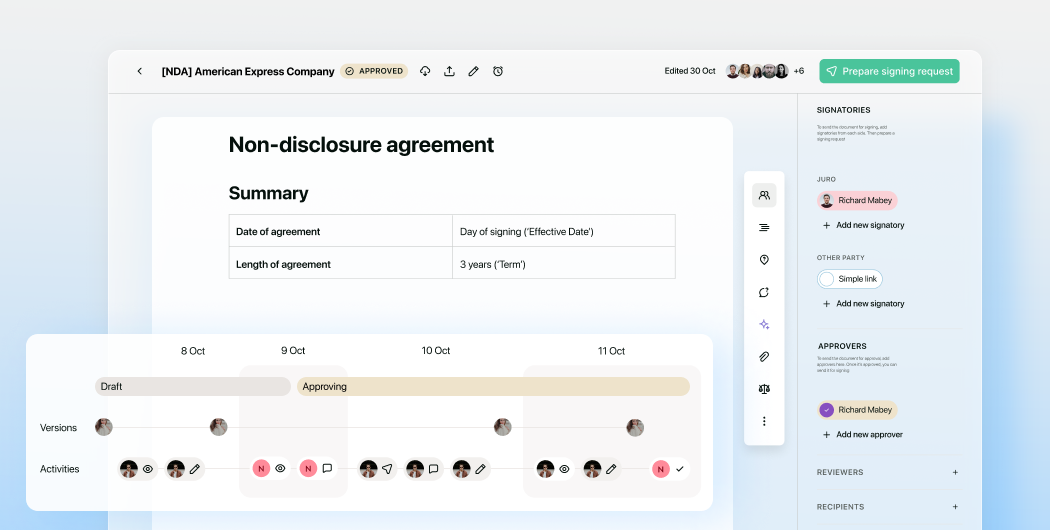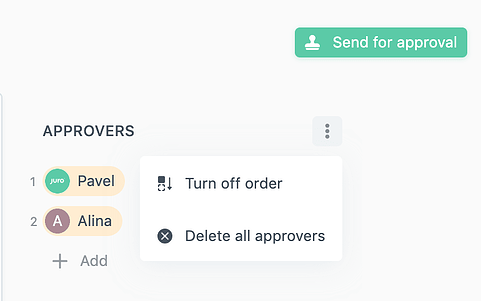Sending a contract for approval can be painful. From miscommunication to loss of version control and long delays, the manual contract approval process has many flaws. However, given the important role that contract approval plays in getting contracts over the line, it’s a stage that legal and business teams can’t afford to overlook.
With automated approval workflow for contracts, reviewing and approving contracts has never been more straightforward.
What is an approval workflow?
An approval workflow is a process whereby a document or decision is passed by one or more individuals or departments for their approval or rejection. Usually this is a defined sequence of tasks that have to happen in order for the project to progress, with input from the relevant people at every stage.
For example, a typical contract approval workflow might look like this:
- The contract creator in the sales team sends the contract for approval
- The contract is then reviewed by legal counsel, who can approve or reject it
- The contract is also reviewed by finance and operations, who provide their verdict
- Once both of the set approvers have provided their approval, a contract can be sent for signature
The purpose of an approval workflow is to empower certain key decision makers to exercise control over a process or piece of work, usually to ensure that certain standards have been met and reduce the risk of costly mistakes. More often than not, these decision makers will be legal counsel, quality assurance executives and other managers.

Why is an approval workflow important?
Approval workflows are particularly important in business as, when set up properly, they can reduce the amount of time wasted, eliminate bottlenecks in important processes and increase productivity and collaboration. Not only that, but approval workflows also add accountability and quality assurance in particular processes, which is often important for compliance purposes.
What is an approval step?
Within an approval workflow, there are various approval steps. Approval steps are used to define the order in which approvals will be required in a certain process. The order that these approval steps follow, and how they are delegated will depend entirely on your company’s internal preferences and processes.
However, what all approval steps have in common is that they determine what needs to be reviewed, who will be responsible for approving or rejecting it, and what happens when either of these options is selected.
What is contract approval?
For those in the legal industry, one of the most common approval workflows is a contract approval, which is the process of submitting, reviewing, assessing, and approving whole contracts or specific terms.
Within an organization, there will usually be concrete rules surrounding which contracts are subject to review and approval, and it will often be high value contracts, rather than standardized contracts with more predictable terms. As part of best practice, this approval process should be outlined in a playbook, or better, automated.
If a contract requires approval, it will usually be pushed to a senior member of the legal team, typically the general counsel, to be assessed, edited and then approved. Although, certain terms will be non-negotiable, and any deviation from these will often be rejected by the approver.
Why is it important to define the approval process in a contract?
But why is it so important to define the approval process for contracts?
Well, any legal practitioner will know that a mistake in a contract can be costly - financially and in terms of time. Not to mention the fact that errors in important legal agreements can tarnish a lawyer’s reputation, or jeopardize a client’s position altogether. That’s why it’s absolutely critical to define the approval process for a contract.
Since the purpose of a contract is to provide certainty and formalize new relationships, it’s essential that contracts are free from ambiguity, inaccuracies and mistakes, and approval workflows are the perfect opportunity to guarantee that. That is if they are efficient and run smoothly, of course.
Risks of manual contract approval processes
What if they don’t run smoothly, though? Unfortunately, this is often the case with manual contract approval processes. With requests for contract approval typically sent via email and at the last minute, important contract deadlines can pass by, and critical clauses can begin to fall through the cracks. With this comes numerous different risks, including:
1. A lack of version control
When you manage a contract in Word, you can find yourself with lots of versions of the same contract, each with different changes, recommendations and comments. As these get thrown around across email, it can be easy to lose control of the versions and mistake an older copy for the current contract.
This means that, without the right tools in place, approvers will be wasting their time labouring over changes that might already have been made. Or worse, they could miss out on important terms in the current contract because they haven’t reviewed the right copy.
In the absence of a single, centralized place to create, share, review and approve legal agreements, miscommunication can be common and so can mistakes.
2. Delays getting contracts across the line
Contracts sent via email for approval can often be added to a lengthy backlog of other tasks, regardless of their urgency.
Too often, busy legal counsel will stumble across an important contract that requires approval when they set their sights on it in their email, and this could be days or weeks after the deal had its initial momentum.
Unlike approval workflows that are automated using software, manual approval workflows can quickly and easily lead to delays in getting contracts across the line, and this inefficiency can jeopardize deals of all types and values.
3. Miscommunication about which deals require approval
Without a structured and clearly defined workflow in place, some contracts may sneak past the approval stage altogether. Unlike automated approval workflows which won’t let a contract progress to other stages without approval, manual contract approval workflows tend not to have any infrastructure in place to prevent this.
This means that even high value contracts are vulnerable to progressing without first receiving approval.
4. Inefficiency when reviewing and approving terms
With a robust contract management software in place it can be quick and easy to identify the terms that need approval, as most of these contract tools can flag specific terms and clauses that require attention.
By comparison, a manual approval workflow can often require in-house legal teams to scroll through the entire contract to review and approve clauses of interest, which can be a considerable drain on their time and resources.
If you can relate to these pain points, it might be time to automate your contract approval workflows instead. Hit the button below to get started or read on to find out more.

















.svg)














.svg)
.svg)
.svg)
.svg)
.svg)
.svg)
.svg)
.svg)

.svg)
.png)
.png)
.png)
.png)
.png)
.png)
.png)
.png)
.png)
.png)



.png)